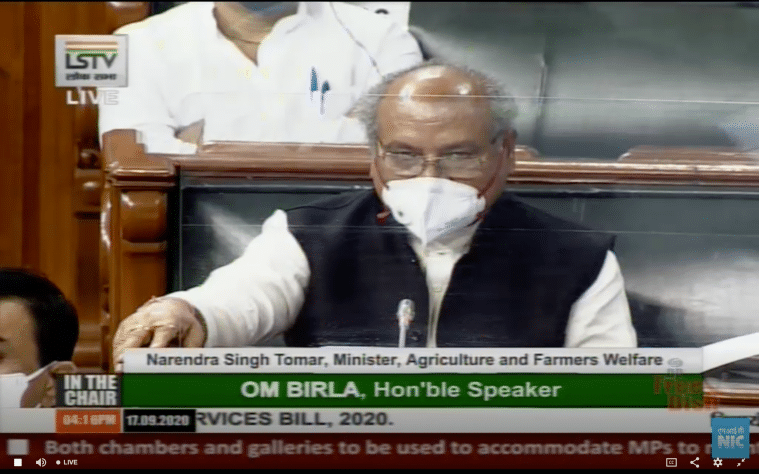3 Agriculture Reform Bills: All You Must To Know About

Agriculture Minister In Lok Sabha
Lok Sabha passed on Thursday 3 Agriculture Reform Bills, the Farmers’ Produce Trade and Commerce (Promotion and Facilitation) Bill, 2020, and The Farmers (Empowerment and Protection) Agreement on Price Assurance and Farm Services Bill, 2020 by a majority voice vote. On Tuesday, the Lower House had passed a third enactment, the Essential Commodities (Amendment) Bill.
They will currently be tabled in Rajya Sabha and will become laws after the Upper House passes them.
“Agriculture Reform Bills are not going to override the Minimum Support Price mechanism, and adequate protection of land ownership was in place to protect farmer interests,” Union Agriculture Minister Narendra Singh Tomar said.
Union Government has said these changes will accelerate development in the division through private area interest in building infrastructure and supply chains for farm produce in public and global business sectors.
They are expected to help small farmers who don’t have intends to either bargain for their produce to get an improved cost or put resources into innovation to improve the productivity of farms.
Agriculture Reform Bills on Agri market looks to permit farmers to sell their produce outside APMC ‘mandis’ to whoever they want. Farmers will get of better costs through rivalry and cost-cutting on transportation. In any case, this Bill could mean states will lose ‘commissions’ and ‘mandi charges’.
The Government on contract cultivating will permit farmers to go into an agreement with agri-business firms or huge retailers on pre-agreed costs of their produce.
The Essential Commodities (Amendment) Bill, 2020, tries to eliminate products like grains, beats, oilseeds, consumable oils, onion, and potatoes from the list of fundamental commodities. This will end the imposition of stock-holding limits aside from under extraordinary conditions.
PM Narendra Modi also addressed on Friday to farmers over worries about costs and the nation’s acquisition framework, under which the administration purchases farm produce at minimum support prices (MSP) from farmers in Agriculture Reform Bills.
“People who ruled this country for decades and were in power…such people are trying to mislead farmers. They are telling lies to farmers,” PM said.
“Fake news is also being spread that wheat and rice etc. will not be procured by government agencies from farmers. This is an absolute lie, completely wrong and an attempt to cheat farmers,” Modi said.
“The reforms will give new freedom to farmers. These reforms will bring more options and opportunities for farmers to sell their produce.”
“Middlemen stand between farmers and their customers; these middlemen take a big chunk of farmers’ income. These reforms have come as a protective shield for farmers.”
Prime Minister Narendra Modi said in a series of tweets, “The agriculture sector will benefit from modern technology and our farmers will also be empowered”.





